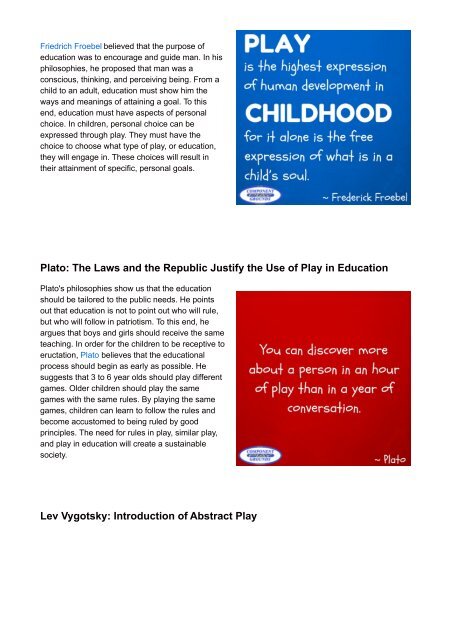Famous Philosophers on the Theory of Play
The idea that children engage in play on a regular basis is a belief that is universally held to be true. This truth can be found across cultures and throughout the history books; however, the content of children's play differs across time and space.
The idea that children engage in play on a regular basis is a belief that is universally held to be true. This truth can be found across cultures and throughout the history books; however, the content of children's play differs across time and space.
Create successful ePaper yourself
Turn your PDF publications into a flip-book with our unique Google optimized e-Paper software.
Friedrich Froebel believed that <strong>the</strong> purpose <strong>of</strong><br />
educati<strong>on</strong> was to encourage and guide man. In his<br />
philosophies, he proposed that man was a<br />
c<strong>on</strong>scious, thinking, and perceiving being. From a<br />
child to an adult, educati<strong>on</strong> must show him <strong>the</strong><br />
ways and meanings <strong>of</strong> attaining a goal. To this<br />
end, educati<strong>on</strong> must have aspects <strong>of</strong> pers<strong>on</strong>al<br />
choice. In children, pers<strong>on</strong>al choice can be<br />
expressed through play. They must have <strong>the</strong><br />
choice to choose what type <strong>of</strong> play, or educati<strong>on</strong>,<br />
<strong>the</strong>y will engage in. These choices will result in<br />
<strong>the</strong>ir attainment <strong>of</strong> specific, pers<strong>on</strong>al goals.<br />
Plato: The Laws and <strong>the</strong> Republic Justify <strong>the</strong> Use <strong>of</strong> <strong>Play</strong> in Educati<strong>on</strong><br />
Plato's philosophies show us that <strong>the</strong> educati<strong>on</strong><br />
should be tailored to <strong>the</strong> public needs. He points<br />
out that educati<strong>on</strong> is not to point out who will rule,<br />
but who will follow in patriotism. To this end, he<br />
argues that boys and girls should receive <strong>the</strong> same<br />
teaching. In order for <strong>the</strong> children to be receptive to<br />
eructati<strong>on</strong>, Plato believes that <strong>the</strong> educati<strong>on</strong>al<br />
process should begin as early as possible. He<br />
suggests that 3 to 6 year olds should play different<br />
games. Older children should play <strong>the</strong> same<br />
games with <strong>the</strong> same rules. By playing <strong>the</strong> same<br />
games, children can learn to follow <strong>the</strong> rules and<br />
become accustomed to being ruled by good<br />
principles. The need for rules in play, similar play,<br />
and play in educati<strong>on</strong> will create a sustainable<br />
society.<br />
Lev Vygotsky: Introducti<strong>on</strong> <strong>of</strong> Abstract <strong>Play</strong>










